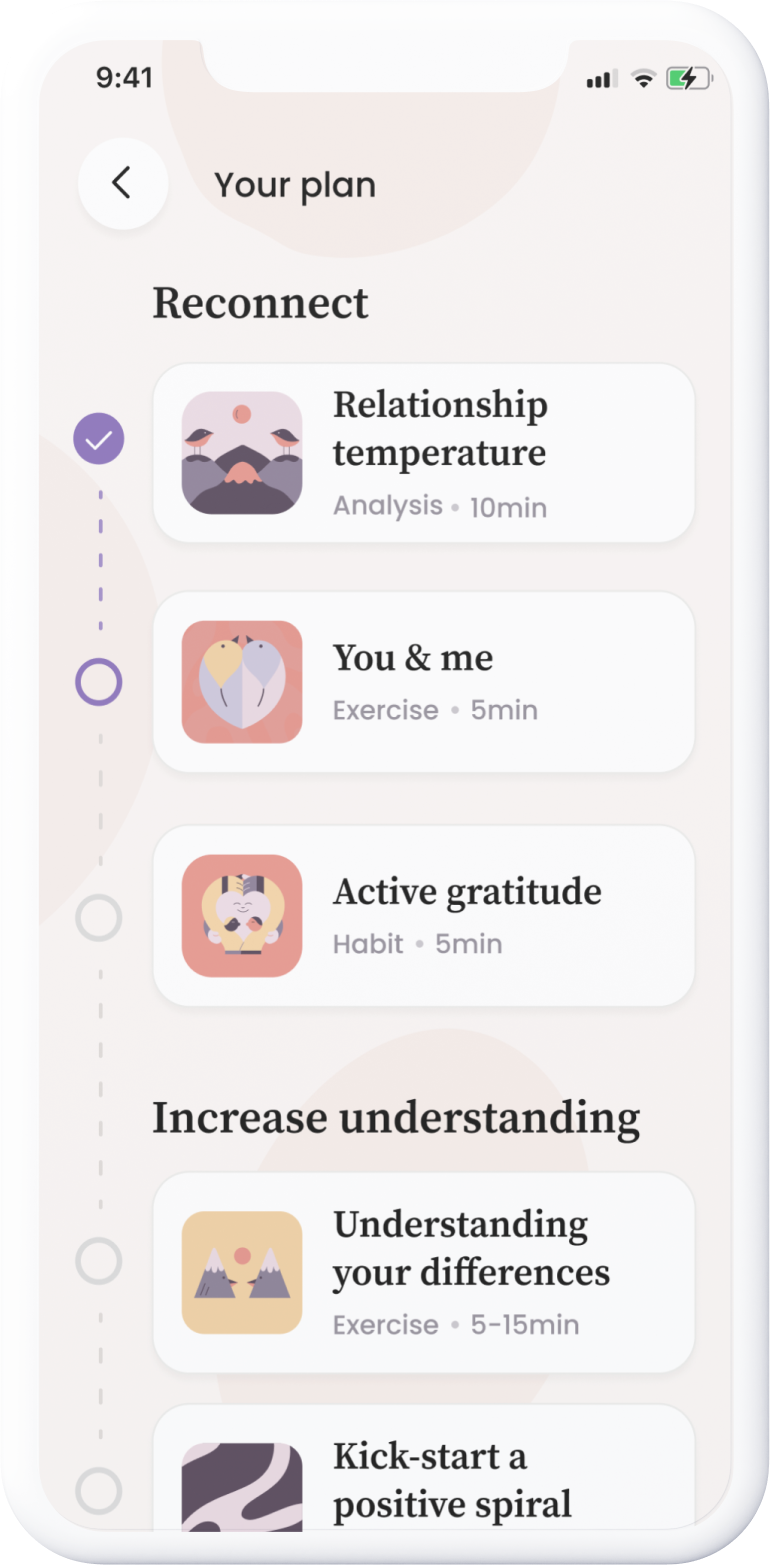
What is active listening? What does it mean? Isn't listening a rather passive act? In this post, we will describe more about why active listening in relationships is almost like a superpower and, most importantly, how to actively listen.
Do you feel listened to in your relationship?
Do you feel listened to? And, truthfully, how well do you listen to your partner? For most of us, the level of how well we are listening varies from time to time. When we're well-rested, interested, and not preoccupied, it's easier. When our partner has a different opinion, it's usually quite challenging! (That's when we often want to start arguing right away...)
You're both responsible for the communication
An important starting point when discussing communication is that both the one who talks and the listener are responsible for the communication! We often think that the most important thing is what we say and how we say it, but it's equally important to listen in a way that encourages the person we're conversing with to continue speaking.
Feeling heard by those close to us is crucial for us as humans, especially in difficult times. If you have a negative feeling, like worry, irritation, or anger, you'll notice that it doesn't feel as intense after you've expressed it and the person you've expressed it to has shown that they hear you. If you don't feel heard and understood, however, it's not certain that it will feel better after you've spoken...
Active listening in relationships leads to increased intimacy
Active listening in a relationship is a skill that's almost like a superpower. It often contributes to both increased emotional intimacy and more effective communication. Here are some tips that you can try next time your partner brings something up with you, or share them with your partner!
Active listening exercise - follow these three steps
- Show that you're genuinely interested. Direct your focus towards your partner, put away your phone, be ready to make eye contact if your partner seeks it. By nodding or humming, you show that you're following along, encouraging your partner to continue speaking.
- Reflect your partner. It means showing that you perceive what your partner is conveying. You reflect by putting into words what your partner expresses. Like saying, "I hear that you seem really stressed out at work right now."
- Stay in your partner's experience. Avoid immediately offering solutions or advice. Also, don't fall into the trap of immediately talking about your own experiences, even if you have thoughts and associations you want to share. It shifts the focus away from your partner's experience, and so if you can wait a bit, there's a greater chance it will land properly.
It can be challenging to actively listen
Active listening isn't always easy! We easily get caught up in a conversation and associate it with our own experiences. It's hard to set aside our own thoughts or values. When we want to help, we're often too eager to offer advice or start problem-solving for our partner. Below, we'll go through some examples of what it might look like when we don't quite succeed with active listening in our relationship and how to do it better.
Outcome 1: You associate with something personal
Your partner: "What a day! My job is just crazy; I don't understand how my boss expects me to tolerate the constant mood swings from my colleague..."
You: "I totally get it, I've had a crazy day too. You know what my boss said when I pointed out that there had been a mistake in the accounting...?"
Your partner: Goes silent and doesn't seem to listen to your story either...
If you were your partner, do you think you would have felt listened to in this scenario? No, certainly not. It's easy to associate with our own experiences and want to share them, but actively listening is something else. If you use the words above, there's a risk that your partner won't feel like sharing more with you right now.
Here's how it could have sounded if you applied active listening:
Your partner: "What a day! My job is just crazy; I don't understand how my boss expects me to tolerate the constant mood swings from my colleague..."
You: "That sounds really tough!"
Your partner: "Yes, I really think I need to bring this up with my boss again. But it's so nice to come home to you, how was your day?"
Outcome 2: You start problem-solving
Your partner: "I'm so stressed today, right now it just feels like too much. I've had a really crappy day, and then my mom called and reminded me that we're supposed to visit her this weekend, I totally forgot..."
You: "But hey, we'll figure it out – it's no problem! If we do the grocery shopping first and then head straight to your mom's, we'll save some time!"
Your partner: "No, that won't work. I don't think I can even handle going grocery shopping. I don't even want to think about the weekend right now; it's too much, like I said!"
It's easy to pick up on something in your partner's story that you see a solution to.
The intention is good; we want to help, and it's tough to see our partner feeling bad without being able to control it. But in this example, it was just one part of what contributed to your partner's stress. Likely, the conversation would have been better if you had first listened and found out more about what's stressing your partner out right now.
Your partner: "I'm so stressed today, right now it just feels like too much. I've had a really crappy day, and then my mom called and reminded me that we're supposed to visit her this weekend, I totally forgot..."
You: (quietly), nodding and maintaining eye contact
Your partner: ".... but what's really stressing me out right now, I think, is that I haven't finished preparing for my presentation tomorrow. Maybe I can sit down for a bit after dinner if that's okay, but first, I just need to eat in peace."
You: "Of course. And do you want to plan for the weekend? Just let me know, and we'll help each other find a better balance."
Outcome 3: You judge what your partner says
Your partner: "I get so tired of my sister cancelling every time we're supposed to meet; she only thinks about herself. No one can have so much to do as she tries to make it seem."
You: "But I think she seems to have a lot going on in her life, it might not be that strange. You've also cancelled a few times, it's not just her."
Your partner: "Not as many times as she has! And no, she doesn't have more to do than we do!"
It's easy to start evaluating what your partner says. Maybe your initial impulse is to disagree and argue. Again, there may be good intentions behind it; you might want to tell your partner that you don't think there's any bad intentions behind the sister's actions. But likely, going in and arguing will make your partner feel like you're not on their side. Your partner might even feel like you're taking the sister's side.
Your partner: "I get so tired of my sister cancelling every time we're supposed to meet; she only thinks about herself. No one can have so much to do as she tries to make it seem."
You: "That's frustrating. I know you were looking forward to seeing her."
Your partner: "Yeah, I know I've also cancelled sometimes. But I don't feel as important to her when she does this, and it's upsetting."
Here, you learn more about your partner's feelings behind the irritation – that they feel rejected and were looking forward to seeing their sister. This builds a stronger and deeper relationship between you.
Active listening in a relationship can be difficult, but with practice, it becomes more natural. With the Ally app you can get help on how to practise active listening in conversations with your partner. Remember, it's about showing genuine interest, reflecting what your partner says, and staying in their experience without judgement or offering immediate solutions. These skills can significantly improve communication and emotional intimacy in your relationship.








